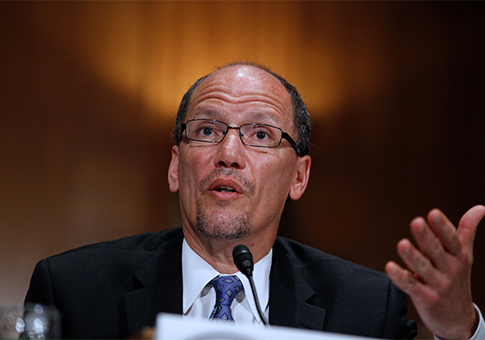President Obama’s nominee for labor secretary allegedly traded away a potential $200 million payday for taxpayers in order to preserve a legal doctrine that drives up the cost of doing business and inflates the college bubble, critics say.
Tom Perez, the head of the Department of Justice’s civil rights enforcement, allegedly arranged to drop a lucrative whistleblower federal lawsuit against St. Paul, Minn., if the city withdrew a Supreme Court suit, according to a House Oversight and Government Reform Committee report.
The city’s Supreme Court suit threatened to overturn disparate impact, a legal theory that allows minorities to accuse employers of discrimination for using neutral standards that do not yield enough minority hires.
Senate Republicans on the Health, Education, Labor, and Pensions Committee grilled Perez during an April 18 confirmation hearing for placing his own legal interests above those of the taxpayer. Perez denied the charge.
"You were worried that the Supreme Court might limit [disparate impact theory], were you not?" asked ranking member Sen. Lamar Alexander (R., Tenn.).
"Sure I was—bad facts made bad law," Perez said.
Disparate impact has been bad law for employers who are forced to engage in expensive forms of screening before hiring potential employees, according to labor attorneys.
"The government seems to be forcing increased costs intentionally upon employers who, faced with a flat-world, efficiency-driven economy, are trying a lowest cost, streamlined hiring process and use of technology to narrow applicant pools," said David Phippen, a labor attorney for Constangy, Brooks, & Smith. "Ultimately employers want to find the best, most capable/qualified people for the positions at lowest cost regardless of class or group."
The New Haven Fire Department threw out the results of a lieutenant and captain’s exam because not enough black candidates passed the test in 2004. Seventeen white firefighters and one Hispanic who were denied promotion sued the city for discrimination. The Supreme Court ruled 5-4 in favor of the white and Hispanic firefighters in the 2009 case Ricci v. DeStefano.
Lino Graglia, a University of Texas law professor, said the city would have been sued either way since black firefighters could have used disparate impact theory to claim the test itself was racist.
"We wanted to be racially neutral; no discrimination of any sort, but [disparate impact] essentially requires that you have to take race into consideration when you make employment decisions," he said. "Disparate impact is a perversion of civil rights legislation. It requires racial discrimination, it changes the [target] of discrimination."
Disparate impact was crafted in the Supreme Court rather than on Capitol Hill. Several black job applicants at the Duke Power alleged in 1971 that the company’s requirement of a high school education for low-level jobs discriminated against black applicants in the case Griggs v. Duke Power Co.
They sued under Title VII of 1964 Civil Rights, which banned racial discrimination in employment decisions. The court ruled that even seemingly neutral standards such as high school diplomas or aptitude tests constitute discrimination if not enough minorities qualify.
"Disparate impact made it more difficult for employers to distinguish candidates or use screening measures that predict good performance," said Amy Wax, University of Pennsylvania Law School professor. "It puts employers in a confusing position—if you hire the best people you open yourself up [to suits]."
Companies have also been forced to prove that employment requirements are necessary for the job. The Obama administration has expanded the scope of the disparate impact beyond hard requirements like diplomas and into soft requirements.
The Equal Employment Opportunity Commission (EEOC), which enforces job discrimination standards along with the Department of Labor, ruled in 2012 that employers could violate disparate impact by refusing to hire people with arrest records, since black people have higher incarceration rates.
Former Labor Secretary Hilda Solis pledged to crack down on employers who discriminated against prospective employees based on criminal records.
"My department is now finalizing guidance to them about how to handle postings that contain hiring exclusions or restrictions based on arrest and conviction history," she told a group of activists soon after the EEOC revision.
Disparate impact has also hurt those looking for jobs. Prospective employees are feeling more pressure to enter college and take on student loan debt before entering the job market.
The Griggs decision may have hurt the people it was designed to help by creating "credentialism in the job market" for even the most basic jobs, according to Wax.
"We began using college education as a screening device for being reasonably productive and it’s incredibly wasteful of time and money," she said. "Ironically, this overtly seems to be hurting black men because they do not go to college at the same rate as whites or Asians or black females."
Perez is not the first supporter of disparate impact to head off Supreme Court limitations on the theory. Disparate impact theory survived through courtroom precedent until 1991. Faced with several potential legal threats going before federal courts the late-Sen. Ted Kennedy (D., Mass.) codified disparate impact in the 1991 Civil Rights Act.
"The court was backing away from Griggs [disparate impact], making it easier for companies to meet business necessity requirements," Graglia said. "That’s what Ted Kennedy and the hyper liberals were trying to fight."
Businesses and job applicants may suffer as a result of enforcement, but the government has turned enforcement into a cash cow. Disparate impact has made it easier to accuse housing providers and companies with discrimination.
Democratic senators at Perez’s confirmation hearing attempted to rebut GOP criticism of the abandoned $200 million lawsuit by pointing out how much money disparate impact netted the federal government.
"Isn't it true that applying disparate impact principle, the Civil Rights Division under your leadership has reached settlements totaling over $600 million with lenders who violated the Fair Housing Act?" Committee Chairman Sen. Tom Harkin (D., Iowa) asked Perez.
"Yes, sir," he replied.
